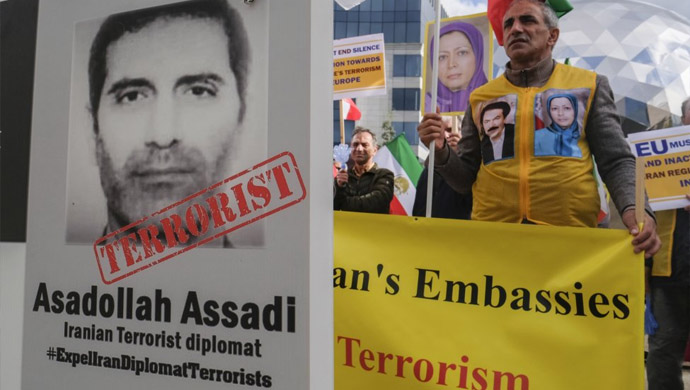As of Wednesday, three Iranian terrorists were attempting to appeal the sentences handed down by a Belgian court in February. Those sentences range from 15 to 18 years and stem from a plot to set off explosives at the Free Iran 2018 rally of the National Council of Resistance of Iran (NCRI).
Had it been successful, the plot would have likely killed hundreds or perhaps even thousands of attendees, including high-profile lawmakers and scholars of foreign affairs from the United States and Europe.
The mastermind of that plot previously announced that he would not be filing an appeal, after having built his defense entirely on the notion that he should be granted diplomatic immunity. Assadollah Assadi was third counsellor at the Iranian embassy in Vienna when the plot was taking shape, and he personally transported the explosives to Europe from Iran on a commercial flight, using his diplomatic pouch to avoid security screenings.
On Wednesday, the NCRI issued a statement in which it suggested that the Iranian regime discouraged the appeal on account of its “fearing a major defeat” that would have exposed more details of the plot and opened the regime’s terrorist networks to even greater scrutiny. The NCRI also raised concern over the lack of scrutiny from Western authorities in the more than three years since the plot was thwarted. Although two members of Assadi’s team were apprehended in possession of the bomb and a third was found to have infiltrated the NCRI rally, the counterterrorism operation revealed the existence of dozens if not hundreds of other operatives who potentially pose a threat to global security even today.
Assadi was arrested shortly after his co-conspirators while attempting to drive back to the protection of his embassy. Among the evidence found in his car was a notebook in which he recorded visits and payments to Iranian nationals spread across at least 11 European countries. The NCRI has repeatedly urged the relevant authorities to publish the names contained in that record, and it reiterated that call in its statement on Wednesday.
There’s concern that Western policymakers are not doing enough to follow up on the intelligence they acquired with Assadi’s arrest. “To dismantle the regime terrorism, the MOIS and the IRGC must be designated as terrorists in their entirety,” the NCRI wrote, referencing the Iranian regime’s Ministry of Intelligence and Security and Revolutionary Guards.
An important step to counter Tehran’s terrorist threat is the prosecution and punishment of Iranian regime operatives in Europe. These persons are abusing their citizenship and refugee status to carry out the deeds of a state-sponsor of terror, and therefore, they must be stripped of asylum and citizenship and be deported from European countries.
The inaction towards Tehran’s terrorism is part of the broader appeasement policy that European governments have adopted regarding the Iranian regime. As many politicians have recommended, a comprehensive policy toward Iran must take into account not only the regime’s foreign terrorist threat but also its domestic human rights abuses and crimes against humanity. What’s more, those concerns have been amplified in recent months following the appointment of Ebrahim Raisi as the regime’s president.
In 1988, Raisi served on the Tehran “death commission” that was primarily responsible for a massacre of 30,000 political prisoners. In 2019, he assumed leadership of Iran’s judiciary and later used that position to oversee key aspects of a crackdown on dissent following nationwide protests in November of that year. At least 1,500 people were killed in that crackdown, and reports of systematic torture continued to emerge from Iranian jails for months afterward. But the relative absence of international backlash may have emboldened Tehran to reward Raisi for his role in the crackdown, and for his broader service to the regime’s strategy of violent repression.
Raisi was openly endorsed by Supreme Leader Ali Khamenei, and therefore became the only viable candidate on the presidential ballot in June 2021. Immediately following his “election,” Amnesty International observed that it was a “grim reminder that impunity reigns supreme in Iran.” Further signs of that impunity quickly followed, with Raisi appointing other officials with criminal backgrounds as the heads of cabinet ministries and other government institutions.
The vast majority of those appointees are members of the IRGC, and many of them are also under sanction by the US and the EU for human rights abuses and support of international terrorism.
Such high profile Iranian terror attacks have been scarce in more recent years, but as the Assadi case makes clear, this is not for lack of trying. If not for the intelligence underlying the law enforcement operations that captured Assadi’s team, the 2018 bomb plot might have been among the worst terrorist attacks on European soil in modern history. Its failure is no justification for Western authorities to rest on their laurels, least of all when the rest of Assadi’s network remains free, and possibly active under different leadership.





